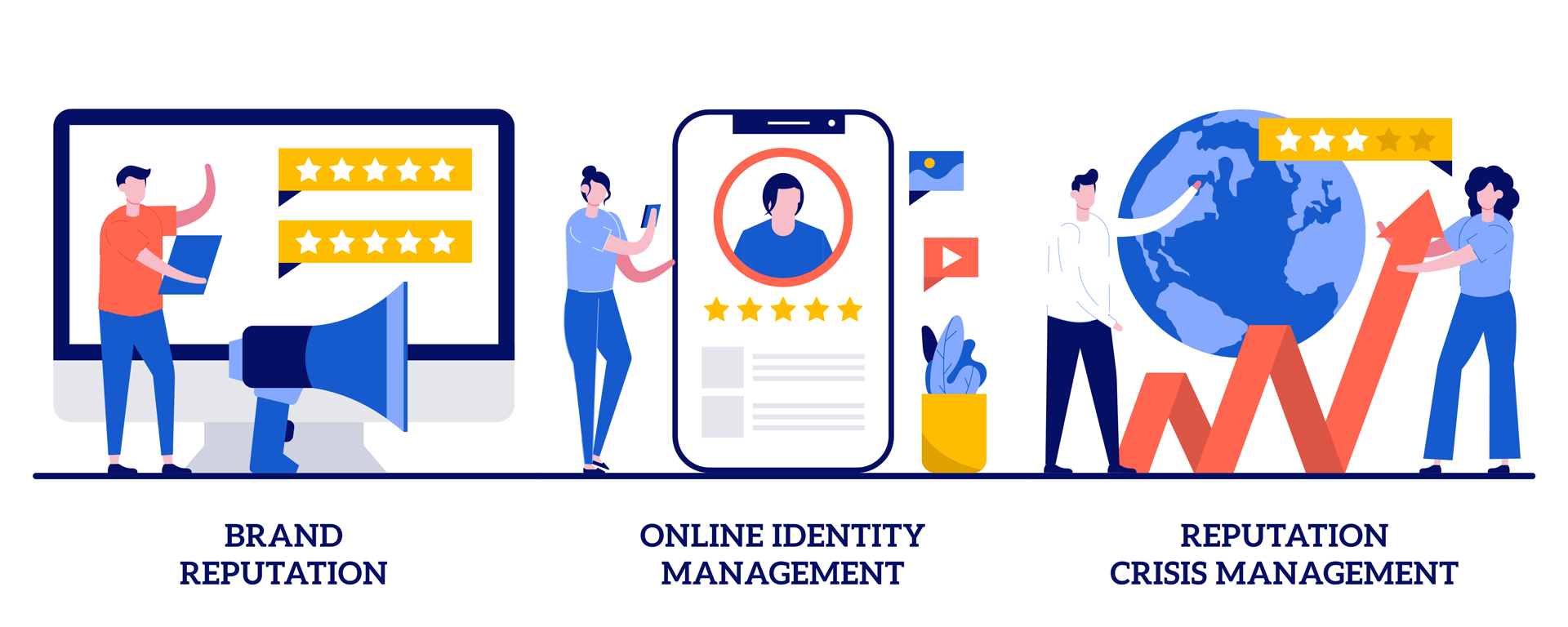How to Master Online Reputation Management in Digital Marketing
TL;DR
Online reputation management in digital marketing (ORM) is crucial for businesses in today’s marketplace, as it influences consumer perceptions and purchasing decisions. A positive online reputation builds trust and credibility, leading to increased sales and a competitive advantage. Effective ORM involves monitoring online presence, engaging with audiences, creating quality content, and addressing feedback. Businesses should implement strategies to manage their online reputation proactively, as it impacts long-term success and brand value.
Quick links:
- Why Online Reputation Management is Important
- The Impact of Online Reputation
- Understanding Online Reputation Management
- Key Components of ORM
- The Benefits of Online Reputation Management
- Crafting an Effective ORM Strategy
- Online Reputation Management Tips
- Online Reputation Management Best Practices
- Take Control of Your Online Reputation Today

Image © Adobe Stock
Why Online Reputation Management is Important
Hello there! 👋 If you’re reading this, you’re likely aware of the immense power that digital marketing holds in today’s business landscape. But let me ask you this: How often do you think about your online reputation? In an era where a single tweet or review can make or break a business, online reputation management in digital marketing is crucial.
The importance of online reputation management cannot be overstated. Whether you’re a small business owner or a decision-maker at a large enterprise, your brand’s reputation is your most valuable asset. It’s not just about managing crises; it’s about building trust and credibility with your audience. Let’s explore why online reputation management is important and how it can transform your business.
The Impact of Online Reputation
Consider this: A potential customer searches for your business online. What do they find? Positive reviews, engaging content, and a strong social media presence? Or negative feedback and outdated information? Your online presence shapes perceptions, influences decisions, and ultimately impacts your bottom line.
In today’s digital age, consumers are more empowered than ever. They have access to a wealth of information at their fingertips, and they rely heavily on online reviews and social media to make informed decisions. This is why online reputation management is not just a nice-to-have; it’s a must-have for any business looking to succeed in the digital marketplace.
%
of global consumers check online reviews as part of their buying journey
Source: Trustpilot
Understanding Online Reputation Management
So, what exactly is online reputation management (ORM), and why is it so freakin’ important? Simply put, ORM involves monitoring and improving how your business is perceived online. It encompasses brand reputation management, online reputation management strategy, and even personal reputation management online.
%
of customers trust brands with positive online reviews
Source: techreport
Key Components of Online Reputation Management
- Monitoring
Keeping an eye on what is being said about your brand across various online platforms is the first step in ORM. This includes social media, review sites, blogs, and forums. - Engagement
Actively engaging with your audience by responding to reviews, comments, and messages shows that you care about their opinions and are committed to providing excellent service. - Content Creation
Producing high-quality, relevant content that reflects your brand’s values and expertise helps establish you as a thought leader in your industry. - Crisis Management
Being prepared to handle negative situations swiftly and effectively is crucial in minimizing damage and restoring confidence.
The Benefits of Online Reputation Management
- Trust and Credibility
A positive online reputation builds trust with your audience. When people see consistent, positive feedback, they’re more likely to choose your products or services. - Enhanced Brand Image
A positive online reputation enhances your brand image, making it more appealing to potential customers and partners. - Increased Online Visibility
A strong online reputation boosts your search engine rankings, making it easier for potential customers to find you. - Increased Sales
Studies show that businesses with strong online reputations experience higher conversion rates. Customers are more likely to buy from brands they trust. - Improved Customer Insights
By monitoring online reviews and feedback, you gain valuable insights into customer preferences and pain points, allowing you to tailor your offerings accordingly. - Crisis Management
Effective ORM helps you respond swiftly to negative situations, minimizing damage and restoring confidence. - Competitive Advantage
In a crowded market, a stellar reputation sets you apart. It becomes a unique selling proposition that competitors can’t easily replicate.
%
of consumers say a negative review convinced them to avoid a company
Source: InMoment
Crafting an Effective Online Reputation Management Strategy
Now that we’ve established the importance of online reputation management in digital marketing, let’s talk about how to create an effective strategy. Whether you’re focusing on small business online reputation management or tackling online personal reputation management, these tips will guide you.
Online Reputation Management Tips
Monitor Your Presence
Use tools like Google Alerts, SEMrush, or Brand24 to keep tabs on mentions of your brand. This helps you stay informed and proactive.
Example: Set up alerts for your brand name, key products, and industry-related terms. This way, you’ll be notified whenever your brand is mentioned online, allowing you to respond promptly.
Engage with Your Audience
Respond to reviews, comments, and messages promptly. Show that you value customer feedback and are committed to improvement.
Example: If a customer leaves a positive review, thank them and encourage them to share their experience with others. If the review is negative, apologize and offer a solution to rectify the issue.
Create Quality Content
Share valuable, engaging content that reflects your brand’s values and expertise. This positions you as a thought leader in your industry.
Example: Regularly publish blog posts, videos, and social media updates that address common customer questions and provide insights into your industry.
Encourage Positive Reviews
Ask satisfied customers to leave reviews on platforms like Google, Yelp, or Trustpilot. Positive reviews boost your credibility.
Example: After a successful transaction, send a follow-up email thanking the customer and providing a direct link to leave a review.
Address Negative Feedback
Handle criticism professionally and constructively. Apologize if necessary, and offer solutions to rectify issues.
Example: If a customer complains about a product defect, offer a replacement or refund and assure them that you’re taking steps to prevent similar issues in the future.
Leverage Social Media
Use social media platforms to connect with your audience, share updates, and showcase your brand’s personality.
Example: Host live Q&A sessions on Instagram or Facebook to engage with your audience and address their concerns in real-time.

Online Reputation Management Best Practices
Transparency
Be open and honest with your audience. Transparency builds trust and fosters loyalty.
Example: If your company is facing a challenge, communicate openly with your customers about the steps you’re taking to address it.
Consistency
Maintain a consistent brand voice and message across all platforms.
Example: Ensure that your branding, messaging, and customer service standards are aligned across your website, social media, and customer support channels.
Proactivity
Don’t wait for a crisis to act. Regularly assess and update your ORM strategy.
Example: Conduct quarterly reviews of your online reputation management strategy to identify areas for improvement and implement changes as needed.
%
Increased conversions by displaying online reviews
Source: Spiegel Research Center
Take Control of Your Online Reputation Today
As we wrap up, I want to emphasize that online reputation management in digital marketing is not a one-time task—it’s an ongoing commitment. Whether you’re managing your brand’s reputation or focusing on online reputation management for individuals, taking control of your online narrative is essential.
Start by implementing the tips and strategies we’ve discussed. Monitor your online presence, engage with your audience, and consistently deliver value. Remember, the advantages of online reputation management extend beyond immediate gains; they lay the foundation for long-term success.
If you’re ready to elevate your digital marketing efforts and enhance your online reputation, I’m here to help. With years of experience in the field, I can guide you in crafting a tailored online reputation management strategy that aligns with your goals. Let’s work together to build a reputation that reflects the true value of your brand.
Feel free to reach out to me for a consultation or to discuss how we can take your online reputation to the next level. Your brand deserves nothing less than excellence. 🏆
We take your trust seriously and recommend only services that we wholeheartedly believe in and use ourselves. Links to recommended services on this page may be affiliate links, and Bonhomie Creative may receive a commission—at no extra cost to you—if you purchase an item using an affiliate link.
Explore recent insights from Bonhomie Creative
What Should a Target CPA Be and How to Set It for Success
Wondering what should a target CPA be? Learn how to optimize your Google Ads campaigns and discover actionable tips to boost conversions …
Email Marketing Best Practices in 2024: How to Boost Engagement and ROI
Explore email marketing best practices for 2024, including personalization, AI, and segmentation to enhance your campaigns.
Leading Video Marketing Trends to Transform Your Marketing Approach
Unlock the potential of your business with the latest video marketing trends! Whether you’re a small business owner or a B2B marketer, these insights will help you connect with your audience and boost engagement. 🎥✨
